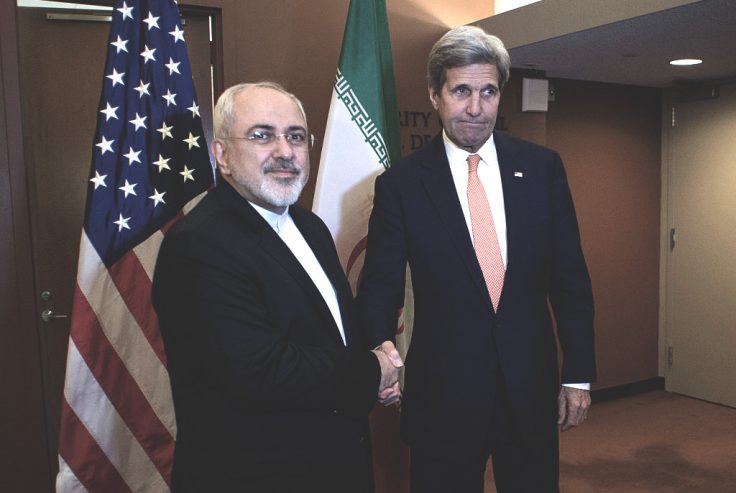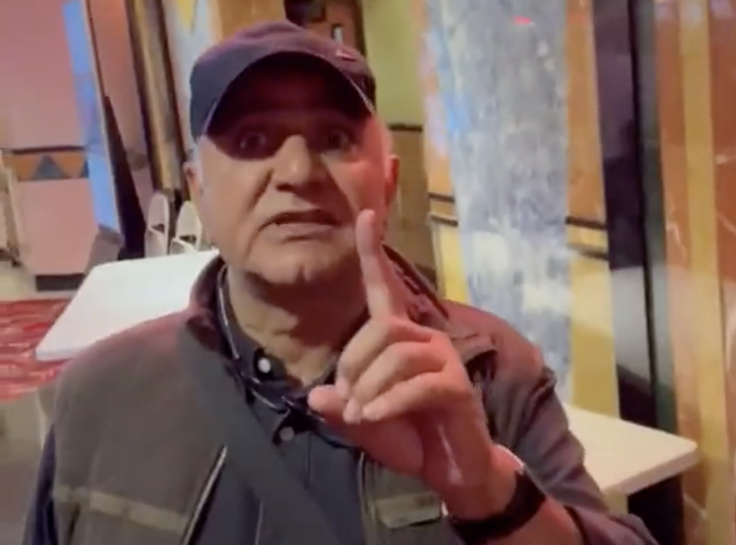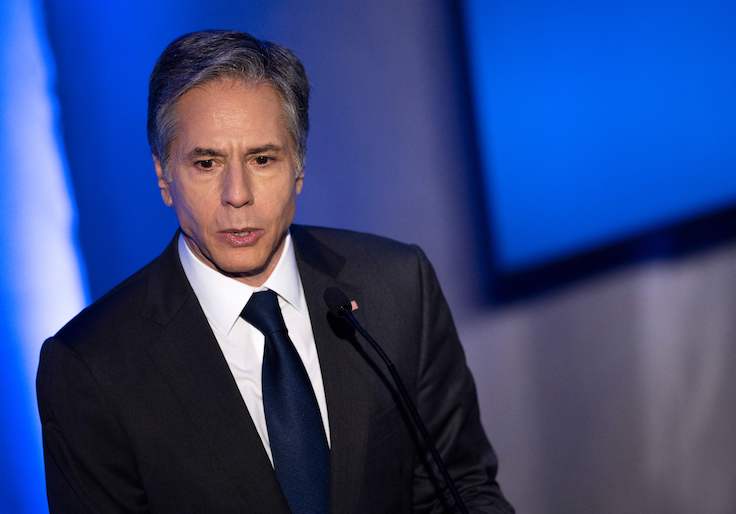Disclosed: How Obama Administration Officials Conducted Shadow Diplomacy With Iran To Undermine Trump

Senior Obama administration officials engaged in a secret meeting with Iran in 2018 as part of an effort to undermine the Trump administration's diplomatic push to isolate the hardline regime, according to an internal State Department document.
As the Trump administration worked to increase economic pressure on Iran in 2018, a delegation of "U.S. former ambassadors held a secret, "off-the-record" meeting with former Iranian foreign minister Javad Zarif at his residence in New York City, according to a State Department memo unearthed this week as part of a lawsuit brought to compel the release of this information. The meeting took place around the same time John Kerry was reported to be working behind-the-scenes with Iranian officials to salvage the 2015 nuclear accord.
The internal memo, which is marked unclassified, details how these former U.S. ambassadors conducted shadow diplomacy with Iran's top envoy surrounding "nuclear weapons, potential prisoner swaps, [the] Afghanistan withdrawal, and negotiations with the Taliban," according to the American Center for Law and Justice (ACLJ), a legal advocacy group that sued the State Department to obtain the internal memo.
The document is the firmest proof to date that Obama-era officials were engaged in back-channel efforts to keep negotiations with Iran alive, even as former president Donald Trump and his administration worked to isolate the regime, former secretary of state Mike Pompeo told the Free Beacon in exclusive remarks. Pompeo, who was not aware of these meetings while leading the State Department, said the memo corroborates reports from the time about Kerry's efforts to salvage the 2015 nuclear deal through back-channel powwows with Iranian officials.
"This memo reflects even more than we already knew about former State Department officials continuing on as if they were still in office," said Pompeo, who is now senior counsel for global affairs at the ACLJ. "Trying, at every turn, to work with the foreign minister for a terrorist regime, Iran, to undermine the very sanctions put in place by America. It's worse than not knowing when to get off stage. Actively seeking to protect the terrible deal they struck, these former officials—two years after Obama left office—were signaling that Iran should stand firm against America."
Pompeo said it is startling to learn that members of a former U.S. administration attempted to handicap a sitting president's policies, describing the disclosure as "bad stuff, dangerous stuff, un-American stuff." These former officials, he said, "should be ashamed of themselves. Working against their own nation's policies alongside such a brutal regime."
The seven-page memo was assembled during the meeting with Zarif, which came just days after reports emerged that Kerry was seeking to salvage the Iran nuclear agreement after Trump nixed it earlier that year. The document was produced after the ACLJ sued the State Department for records about any secret meetings between Zarif, Kerry, current U.S. Iran-Envoy Robert Malley, and former Obama secretary of energy Ernest Moniz.
During the meeting, Zarif claimed that Trump's policies have fomented anti-U.S. fervor in Iran and pointed to the popularity of Islamic Revolutionary Guards Corps (IRGC) leader Qassem Soleimani, who was assassinated by Trump two years later in a drone strike.
"I was as popular as Soleimani, but now I am at 47 percent and his is up," Zarif said, according to the memo. "He is closer to 80 percent. People of Iran once preferred engagement, now opted for resistance as the only reality. That is what the polls are telling us now and it is the reality of the region."
Zarif also said his government would never give up its missile program or stop enriching uranium, the key component in a nuclear weapon and one of the conditions Trump placed on a potential new deal with Iran that never materialized.
"The U.S. says no peace deal and the U.S. will reimpose sanctions, but the condition is zero missiles, zero nuclear enrichment. This what [John] Bolton wants," Zarif said, referring to Trump's national security adviser. "I know Bolton and negotiated with him years ago. His views are so radical, that we could not reach an agreement. Absolute impossibility to reach an agreement with John Bolton unless you ask him to sit down and read at dictation speed what he wants and then you sign it. He is incapable of compromise."
Zarif also discussed his views on Iraq, potential prisoner swaps with the United States, and Iranian support for terror groups like Hezbollah and the Houthi rebels in Yemen.
As part of the ACLJ's effort to force the release of further information on these back-channel talks with Iran, it received a series of internal State Department emails showing that after Kerry left office, he used State Department staffers to send correspondence to Zarif.
Ben Sisney, ACLJ's senior litigation counsel, said the organization's legal efforts prove that "there were even more secret meetings happening behind the Trump administration’s back than had been previously reported."
But Sisney said it also raises further questions: "How did this memo of ‘former' U.S. officials meeting with Zarif get into the State Department's hands? Was someone at the State Department there? Did the State Department send an informal liaison?"
Update 7:35 p.m.: This piece has been updated to clarify Kerry's role in the diplomacy with Iran.
Congress Investigates Biden Admin for Granting Visa to Iranian Ally of Terror Leader Soleimani

Congress is probing the Biden administration over its decision to grant a U.S. visa to an Iranian national tied to Iran’s terrorist fighting force and its former leader, Qassem Soleimani.
Rep. Jim Banks (R., Ind.), a member of the House Armed Services Committee, is asking the Biden administration to explain why it granted a visa to Iranian actor Parviz Parastui, according to a copy of the investigation letter obtained by the Washington Free Beacon. The lawmaker says Parastui has an "overt connection" to the Islamic Revolutionary Guard Corps (IRGC), the U.S.-designated terror organization responsible for killing scores of Americans.
Parastui was permitted to attend a film screening event in Los Angeles late last month that was organized by the far-left anti-Israel group Code Pink. While attending the event, Parastui was caught on camera assaulting an Iranian dissident who challenged him on the regime’s human rights abuses. Parastui’s ties to the hardline regime and support for Soleimani—which includes signing a 2020 letter by Iranian leaders condemning the Trump administration’s assassination of the terrorist leader, who they referred to as a "martyr"—should disqualify him from entering the United States, according to Banks and former top U.S. officials who spoke to the Free Beacon about the situation.
Parastui’s visit comes amid active threats by Iran and the IRGC to assassinate U.S. officials, including former secretary of state Mike Pompeo. It also comes as the Biden administration mulls lifting the IRGC’s terror designation as part of a package of concessions to Iran meant to entice it into signing a new version of the 2015 nuclear accord.
"Parastui has been directly involved in IRGC-funded propaganda projects, promoting a hardliner ideology that seeks to shape Iran’s culture to the agenda of the Iranian regime," Banks wrote in a letter to Secretary of State Antony Blinken and Homeland Security secretary Alejandro Mayorkas. "He played roles in numerous pro-regime and pro-IRGC films. Parastui also never shies away from expressing his affinity with the IRGC in public."
In a statement to the Free Beacon regarding Parastui's entry into the United States, the State Department said, "Visa records are confidential under U.S. law; therefore, we cannot discuss the details of individual visa cases."
Parastui vocally supported Soleimani, praising him in television interviews, and is seen in photos meeting with the terror leader and other senior IRGC figures, highlighting "just how close he is to key figures in the terrorist organization," according to Banks.
Banks maintains that the State Department’s decision to grant Parastui a visa undermines U.S. efforts to isolate the hardline Iranian government, the IRGC terror group, and the country's jihadist proxy organizations, which continue to conduct attacks on American outposts in the region. It also could help Iran trigger terrorist cells based in America, according to Banks.
"Your departments have allowed notorious, high-profile affiliates of the IRGC into our country even before the [IRGC] is delisted," Banks wrote. "I can only imagine how members of the IRGC could rush to the United States legally to exploit our market and financial system and carry out terrorist activities against the United States, if the IRGC is indeed delisted."
The lawmaker asked the State Department and DHS to respond no later than May 20 and explain the process that led to Parastui and his entourage obtaining visas. This includes the name or names of those involved in approving the visas.
"What vetting procedure do you have in place to ensure that supporters or defenders of Iranian terrorism will not be admitted into the United States?" Banks asked.
Banks also wants to know if the State Department reviews social media posts from visa applicants "to evaluate their potential ties to the IRGC and other Iranian terrorist groups."
"Is IRGC affiliation a criterion in evaluating whether an alien can be granted U.S. permanent resident status?" Banks asked in the letter. "What steps are you taking to ensure that Iranian agents—particularly those seeking to assassinate US officials—are not masquerading as ordinary Iranians requesting tourist visas?"
Banks also asked the State Department to provide detailed information on its efforts to counter Iranian disinformation and propaganda. Iran was cited as one of several adversarial regimes, including Russia, that attempted to sway the results of the 2020 presidential election.
Gabriel Noronha, a State Department special adviser for Iran during the Trump administration, questioned the decision to grant Parastui a visa.
"It’s deeply concerning that the State Department is granting visas to Soleimani sympathizers while the regime has repeatedly proclaimed it is trying to kill U.S. officials in revenge for Qassem Soleimani," Noronha told the Free Beacon. "If they can’t do basic vetting now, it’ll get far worse if they lift visa sanctions on the hundreds of thousands of IRGC members. They don’t seem to have any plan to prevent even worse terrorists from coming into our country."
Ellie Cohanim, who served as the State Department's deputy special envoy to monitor and combat anti-Semitism during the Trump administration, warned that Iran’s hardline allies could stir up trouble once inside the United States.
"At a time when Secretary Blinken testified to Congress that the Iranian regime is posing ‘an ongoing threat against American officials, both present and past,’ it is unconscionable that the Biden State Department issued a visa to an IRGC associate like Parviz Parastui," Cohanim said. "Parastui is here ostensibly on a film tour but is there any way to know whether he is here to activate a sleeper cell? Or pass on messages to Iranian nationals who reside in the U.S.? Why at a time when U.S. government officials are under threat would the Biden administration allow onto U.S. soil an Iranian regime apparatchik like Parastui?"
‘Soft on China’: Blinken To Unveil Biden Admin’s China Policy at China-Friendly Org

After months of buildup, Secretary of State Antony Blinken will outline the Biden administration’s China strategy on Thursday. His venue: an event hosted by a group friendly to the Chinese Communist Party.
Blinken will give his much-anticipated speech at an event hosted by the Asia Society, a U.S.-based nonprofit that aims "to build bridges of understanding between Americans and Asians." The speech comes as the administration weighs whether to relax Trump-era tariffs imposed on China and prepares for diplomatic talks in Asia.
The event could undermine the Biden administration’s attempt to talk tough on China. Several Chinese state-owned companies—including the China Investment Corporation and State Grid Corporation of China—are part of the Asia Society’s global corporate network, which helps members engage with "corporate leaders, policymakers, and influencers." One of the Asia Society’s trustees is Ning Gaoning, a Chinese Communist Party official whose company, Sinochem, has been blacklisted by the United States government over its ties to the Chinese military.
The Asia Society also has ties to the Chinese Communist Party’s propaganda machine. It helped establish dozens of Confucius Institute classrooms across the country. U.S. government officials have warned that the Chinese government uses Confucius Institutes to disseminate pro-Beijing propaganda at American colleges and high schools. Another Asia Society board member is an official with the China-United States Exchange Foundation, a think tank that directs the Chinese Communist Party’s overseas influence activities.
"It's unclear why Blinken chose Asia Society as a host," said Anders Corr, an intelligence analyst and publisher of the Journal of Political Risk. Corr said Asia Society’s "soft-on-China reputation" and financial ties to state-controlled companies means it "should be avoided by U.S. government officials at any cost."
Blinken is not expected to announce any major policy shifts toward China at the event, which he postponed earlier this month after contracting COVID-19. His speech comes amid intense debate in the Biden administration and business community over Trump-era tariffs against Chinese companies. Trade Representative Katherine Tai and officials on the National Security Council want to maintain tariffs while Commerce Secretary Gina Raimondo and others want to ease some in order to lower prices amid high inflation, the New York Times reported. Blinken is not expected to explicitly address how the administration should handle tariffs, according to the Times.
The Asia Society and many of its corporate sponsors support a rollback of tariffs. Anna Ashton, an official with the Asia Society Policy Institute, recently said the Chinese government had exercised "a great deal of patience" in hoping that American policymakers "would come to their senses" about the economic relationship between Washington and Beijing.
The State Department and Asia Society did not respond to requests for comment.
No comments:
Post a Comment